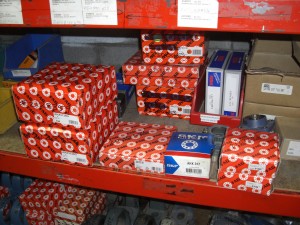 Here is a useful and practical MRO definition that identifies MRO separately from materials and spare parts.
Here is a useful and practical MRO definition that identifies MRO separately from materials and spare parts.
Often people refer in books, magazines, blogs, presentations and so on to MRO, materials, and spare parts; but what do these individual terms really mean? And does it really matter?
This is the official SparePartsKnowHow.com MRO definition and a comparison with definitions of materials and spare parts.
- MRO = Maintenance, Repairs and Operations. When used in relation to materials and spare parts this term is referring to the items that are used to fulfill the functions of maintenance, repairs, and operations support – that is consumables such as materials and spare parts.
- MRO can also be used to mean Maintenance, Repair and Overhaul. This really has the same the above description.
- MRO is sometimes used to refer to Maintenance and Repair Organizations (as in, MROs). In this case it is used to refer to the organizations that fulfill these functions.
- Materials – typically this term refers to items that are purchased that are not used for production, as in they don’t become the widget that is being produced. They are not necessarily spare parts as they could be maintenance consumables (oil, grease, welding rods etc.) or items purchased for fabrication (for example, steel).
- Spare Parts –items held in inventory that are used to replace failed parts or components. This could be anything from a drive belt or bearing through to entire components such as a pump set.
Does it matter? From the above definitions you can see that it does actually matter – the terms are not interchangeable.
It is important that your team uses the terms in the same way as this will avoid confusion in their communication. One way to help with this is to ensure that you have an mro definition (plus materials and spare parts) within your spare parts management policy documentation.
For information on our Pro Level membership please visit our Pro Level page.
Posted by: Phillip Slater